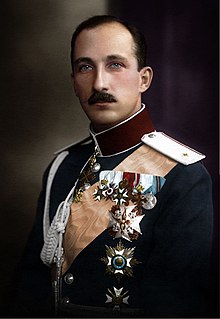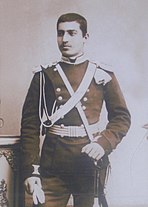 W
WAlexander III was Emperor of Russia, King of Poland and Grand Duke of Finland from 13 March 1881 until his death on 1 November 1894. He was highly reactionary and reversed some of the liberal reforms of his father, Alexander II. Under the influence of Konstantin Pobedonostsev (1827–1907), he opposed any reform that limited his autocratic rule. During his reign, Russia fought no major wars; he was therefore styled "The Peacemaker".
 W
WBoris III, originally Boris Klemens Robert Maria Pius Ludwig Stanislaus Xaver, was the Tsar of the Kingdom of Bulgaria from 1918 until his death.
 W
WCarol or Charles I of Romania, born Prince Karl of Hohenzollern-Sigmaringen, was Prince of Romania from 1866 to 1881, and then King of Romania from 1881 to 1914. He was elected Ruling Prince (Domnitor) of the Romanian United Principalities on 20 April 1866 after the overthrow of Alexandru Ioan Cuza by a palace coup d'état. In May 1877, he proclaimed Romania an independent and sovereign nation. The defeat of the Ottoman Empire (1878) in the Russo-Turkish War secured Romanian independence, and he was proclaimed King of Romania on 26 March [O.S. 14 March] 1881. He was the first ruler of the Hohenzollern-Sigmaringen dynasty, which ruled the country until the proclamation of a socialist republic in 1947.
 W
WPetar Georgiev Darvingov was a Bulgarian officer, revolutionary and military historian, corresponding member of Bulgarian Academy of Sciences from 1932.
 W
WLeutnant Rudolf von Eschwege was a German World War I flying ace who was the German Empire's only fighter pilot operating on the Macedonian front. He was credited with twenty confirmed and six unconfirmed victories.
 W
WArchduke Eugen Ferdinand Pius Bernhard Felix Maria of Austria-Teschen was an Archduke of Austria and a Prince of Hungary and Bohemia. He was the last Grand Master of the Teutonic Knights from the Habsburg dynasty.
 W
WFranz Joseph I or Francis Joseph I was Emperor of Austria, King of Hungary, Croatia, and Bohemia, and monarch of other states of the Austro-Hungarian Empire, from 2 December 1848 until his death. From 1 May 1850 to 24 August 1866 he was also President of the German Confederation. He was the longest-reigning ruler of Austria and Hungary, as well as the sixth-longest-reigning monarch of any country in European history.
 W
WArchduke Friedrich, Duke of Teschen was a member of the House of Habsburg and the Supreme Commander of the Austro-Hungarian Army during World War I.
 W
WLouis IV was the Grand Duke of Hesse and by Rhine, reigning from 13 June 1877 until his death. Through his own and his children's marriages he was connected to the British Royal Family, to the Imperial House of Russia and to other reigning dynasties of Europe.
 W
WWilhelm II, anglicised as William II, was the last German Emperor (Kaiser) and King of Prussia. His reign lasted from 15 June 1888 to 9 November 1918. Despite strengthening Germany’s position as a great power by building a blue-water navy and promoting scientific innovation, his tactless public statements and reckless foreign policy greatly antagonized the international community and ultimately plunged his country into World War I. When the German war effort collapsed after a series of crushing defeats on the Western Front in 1918, he was forced to abdicate, thereby bringing an end to the Hohenzollern dynasty’s three hundred year rule.